

A new preliminary study contradicts the perception that lingering COVID-19 symptoms mostly affect middle-aged adults, with evidence that a majority of young adults also experience chest pain, breathing difficulty, headaches, diarrhea, loss of smell or taste and other complications for weeks after diagnosis, according to new research led by University of Dayton assistant professor of psychology Julie Walsh-Messinger, along with Noah Greenspan and Marcella Debidda of the Pulmonary Wellness Foundation, and Dr. Dolores Malaspina of the Icahn School of Medicine at Mount Sinai.
The study, which included more than 40 university students who tested positive or were diagnosed with mild or moderate COVID-19, found a majority (51%) continued to experience symptoms and complications more than 28 days later and 30% experienced these symptoms for 50 days or longer.
“The common belief in the U.S. is that COVID-19 is benign or short-lived in young adults,” Walsh-Messinger said. “Our study, which we believe is the first to report on post-COVID syndrome in college students, almost exclusively between 18 and 21 years of age, suggests otherwise. More research needs to be done to confirm these findings, but until then, we urge the medical and scientific community to consider young adults vulnerable to post-COVID syndrome and to closely monitor those who contracted the disease for lingering viral effects.”
The researchers also surveyed an additional 58 students who did not have COVID to show that the prolonged symptoms were not due to general age or pandemic related stress or non-COVID seasonal illness.
The study, which is available on the pre-print server MedRxiv and has been submitted for peer review, builds on the work of those experiencing lingering symptoms, commonly called “long haulers,” who formed social media advocacy groups after many were not experiencing resolution of symptoms within the two to three weeks that were expected. These groups, including the COVID-19 Longhauler Advocacy Project, founded by study co-author Karyn Bishof, initiated patient driven surveys to raise awareness of post-COVID syndrome.
Walsh-Messinger said the study also “is consistent with the sex differences in COVID mortality and morbidity noted in other studies. Males are more likely to succumb to the virus, but women appear to be more vulnerable to post-COVID syndrome.”
The Pulmonary Wellness Foundation https://pulmonarywellness.org offers free resources and support for people experiencing lingering COVID in addition to remote and in-person consultation and rehabilitation.







































